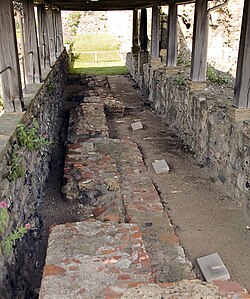Deusdedit of Canterbury
| Deusdedit | |
|---|---|
| Archbishop of Canterbury | |

The location of Deusdedit's unmarked grave, at St Augustine's Abbey in Canterbury. The graves marked with stones are those of Justus, Mellitus, and Laurence.
|
|
| Appointed | 655 |
| Term ended | c. 664 |
| Predecessor | Honorius |
| Successor | Wighard |
| Orders | |
| Consecration | March 655 by Ithamar |
| Personal details | |
| Birth name | perhaps Frithona |
| Born | unknown England |
| Died | c. 664 |
| Buried | St Augustine's Abbey, Canterbury |
| Sainthood | |
| Feast day | 14 July |
| Venerated in |
Eastern Orthodox Church Roman Catholic Church Anglican Communion |
| Canonized | Pre-Congregation |
Deusdedit (died c. 664), perhaps originally named Frithona, Frithuwine or Frithonas, was a medieval Archbishop of Canterbury, the first native-born holder of the see of Canterbury. By birth an Anglo-Saxon, he became archbishop in 655 and held the office for more than nine years until his death, probably from plague. Deusdedit's successor as archbishop was one of his priests at Canterbury. There is some controversy over the exact date of Deusdedit's death, owing to discrepancies in the medieval written work that records his life. Little is known about his episcopate, but he was considered to be a saint after his demise. A saint's life was written after his relics were moved from their original burial place in 1091.
A post-Norman Conquest tradition, originating with Goscelin, gives Deusdedit's original name as Frithona, possibly a corruption of Frithuwine. He was consecrated by Ithamar, Bishop of Rochester, on 26 March or perhaps 12 March 655. He was the sixth archbishop after the arrival of the Gregorian missionaries, and the first to be a native of the island of Great Britain rather than an Italian, having been born a West Saxon. One reason for the long period between the Christianization of the Kentish kingdom from Anglo-Saxon paganism in about 600 and the appointment of the first native archbishop may have been the need for the schools established by the Gregorian missionaries to educate the natives to a sufficiently high standard for them to take ecclesiastical office. Deusdedit probably owed his appointment to the see of Canterbury to a collaboration between Eorcenberht of Kent and Cenwalh of Wessex. The name Deusdedit means "God has given" in Latin, and had been the name of a recent pope,Deusdedit, in office from 615 to 618; it was the practice of many of the early medieval Saxon bishops to take an adopted name, often from recent papal names. It is unclear when Deusdedit adopted his new name, although the historian Richard Sharpe considers it likely to have been when he was consecrated as an archbishop, rather than when he entered religious life.
...
Wikipedia
